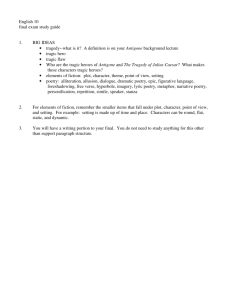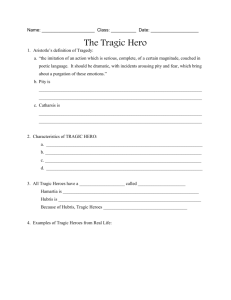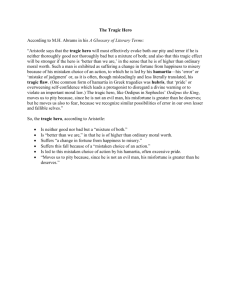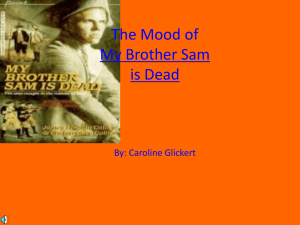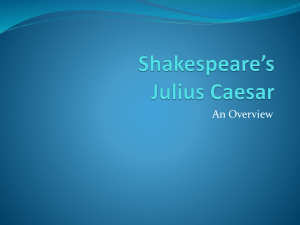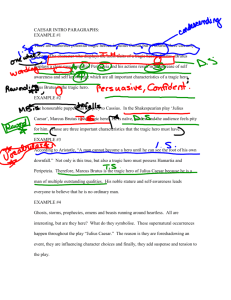The Tragic Hero
advertisement
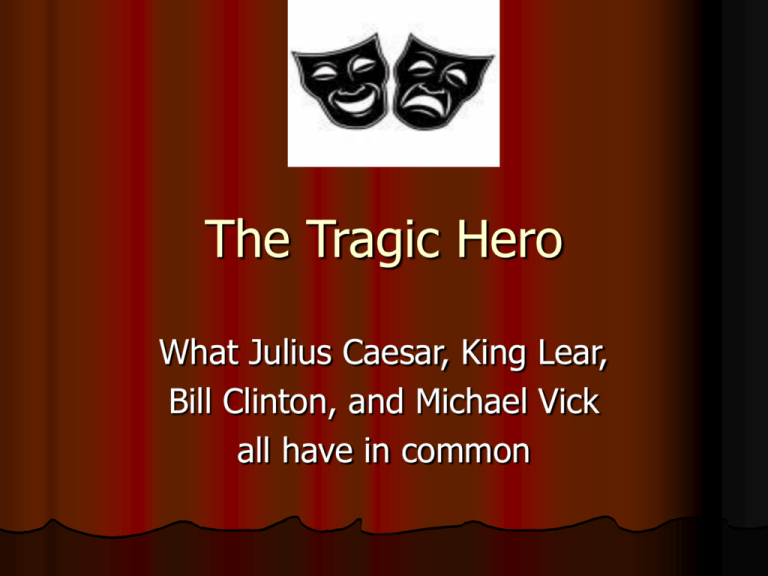
The Tragic Hero What Julius Caesar, King Lear, Bill Clinton, and Michael Vick all have in common Aristotelian Definition of Tragedy Aristotle defined tragedy as "the imitation of an action that is serious and also, as having magnitude, complete in itself." It incorporates "incidents arousing pity and fear, wherewith to accomplish the catharsis of such emotions." Definition of a Tragic Hero A tragic hero has the potential for greatness but is doomed to fail. He is trapped in a situation where he cannot win. He makes some sort of tragic flaw, and this causes his fall from greatness. Even though he is a fallen hero, he still wins a moral victory, and his spirit lives on. TRAGIC HEROES ARE BORN INTO NOBILITY/BEGIN AT A HIGH STATION IN LIFE Julius Caesar—Great Roman General King Lear—King of Britain Bill Clinton—governor of Arkansas, president of the United States Michael Vick—highly celebrated quarterback Tragic Heroes Are RESPONSIBLE FOR THEIR OWN FATE Julius Caesar—alienates the senators and names himself emperor for life King Lear—no longer wants responsibility of being a king Bill Clinton—made the decision to be unfaithful to his wife Michael Vick—chose to sponsor dog fights Tragic Heroes Are ENDOWED WITH A TRAGIC FLAW Julius Caesar—pride King Lear—values appearances over reality Bill Clinton—pride Michael Vick—pride Definition of a Tragic Flaw The tragic effect will be stronger if the hero is "better than we are," in that he is of higher than ordinary moral worth. Such a man is shown as suffering a change in fortune from happiness to misery because of a mistaken act, to which he is led by his hamartia (his "effort of judgment") or, as it is often literally translated, his tragic flaw. One common form of hamartia in Greek tragedies was hubris, that "pride" or overweening self-confidence which leads a protagonist to disregard a divine warning or to violate an important law. Tragic Heroes Are DOOMED TO MAKE A SERIOUS ERROR IN JUDGEMENT Julius Caesar—trusted Brutus and Cassius King Lear—values Goneril and Regan’s fawning over Cordelia’s sincere love Bill Clinton—romantically involved with an intern Michael Vick—assumes dog fighting will not affect his football career EVENTUALLY, TRAGIC HEROES FALL FROM GREAT HEIGHTS OR HIGH ESTEEM Julius Caesar—is murdered by his friends King Lear—sinks into insanity Bill Clinton—is impeached Michael Vick—indicted by the courts, suspended by NFL EVENTUALLY, TRAGIC HEROES REALIZE THEY HAVE MADE AN IRREVERSIBLE MISTAKE Julius Caesar—says “Et tu Brute?” King Lear—realizes his weakness opposed to the forces of nature Bill Clinton—publicly apologized for his indiscretions Michael Vick—publicly apologizes for dog fighting EVENTUALLY, A TRAGIC HERO FACES AND ACCEPTS DEATH WITH HONOR Julius Caesar—says, “Then fall Caesar” King Lear—accepts imprisonment with Cordelia Bill Clinton—the “death” of his integrity Michael Vick—pleads guilty EVENTUALLY, TRAGIC HEROES MEET A TRAGIC DEATH Julius Caesar—dies in the senate house King Lear—dies in grief over Cordelia’s execution Bill Clinton—ends his presidency with shame over impeachment Michael Vick— “death” of his NFL career FOR ALL TRAGIC HEROES THE AUDIENCE IS AFFECTED BY PITY and/or FEAR The tragic hero reminds us of the flaws in ourselves and forces us to examine how we deal with our lives. We fear the same fate. Good or Evil? The tragic hero will most effectively evoke both our pity and terror if he is neither thoroughly good nor thoroughly evil but a combination of both. Reflection How do each of these tragic heroes evoke our pity and fear? How do they display both good and evil characteristics? Julius Caesar King Lear Bill Clinton Michael Vick
